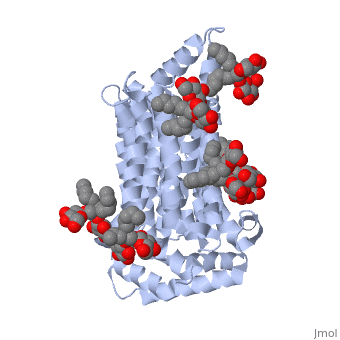We apologize for Proteopedia being slow to respond. For the past two years, a new implementation of Proteopedia has been being built. Soon, it will replace this 18-year old system. All existing content will be moved to the new system at a date that will be announced here.
Sandbox Reserved 1387
From Proteopedia
(Difference between revisions)
| Line 12: | Line 12: | ||
== Disease == | == Disease == | ||
| - | Defects in GLUT3 can cause fetal death as well as neurodegeneration, which can lead to diseases like Alzheimer’s. In the case of Alzheimer's Disease (AD), the defective GLUT3 does not provide neurons with optimal glucose concentrations. Autopsies of AD patients have shown higher sugar concentrations in the brain's extracellular tissue while also possessing abnormally low GLUT3 counts. | + | Defects in GLUT3 can cause fetal death as well as neurodegeneration, which can lead to diseases like Alzheimer’s. In the case of Alzheimer's Disease (AD), the defective GLUT3 does not provide neurons with optimal glucose concentrations. Autopsies of AD patients have shown higher sugar concentrations in the brain's extracellular tissue while also possessing abnormally low GLUT3 counts<ref>DOI 10.1016/j.jalz.2017.09.011</ref>. |
In Type 2 Diabetes patients, there is a decrease in the amount of transcripts that encode for GLUT3. | In Type 2 Diabetes patients, there is a decrease in the amount of transcripts that encode for GLUT3. | ||
Revision as of 04:18, 1 March 2018
| This Sandbox is Reserved from January through July 31, 2018 for use in the course HLSC322: Principles of Genetics and Genomics taught by Genevieve Houston-Ludlam at the University of Maryland, College Park, USA. This reservation includes Sandbox Reserved 1311 through Sandbox Reserved 1430. |
To get started:
More help: Help:Editing |
Homo sapien Glucose Transporter GLUT3 / SLC2A3
| |||||||||||
References
- ↑ https://www.ebi.ac.uk/pdbe/entry/pdb/5c65
- ↑ Simpson IA, Dwyer D, Malide D, Moley KH, Travis A, Vannucci SJ. The facilitative glucose transporter GLUT3: 20 years of distinction. Am J Physiol Endocrinol Metab. 2008 Aug;295(2):E242-53. doi:, 10.1152/ajpendo.90388.2008. Epub 2008 Jun 24. PMID:18577699 doi:http://dx.doi.org/10.1152/ajpendo.90388.2008
- ↑ doi: https://dx.doi.org/10.2147/CHC.S60484
- ↑ An Y, Varma VR, Varma S, Casanova R, Dammer E, Pletnikova O, Chia CW, Egan JM, Ferrucci L, Troncoso J, Levey AI, Lah J, Seyfried NT, Legido-Quigley C, O'Brien R, Thambisetty M. Evidence for brain glucose dysregulation in Alzheimer's disease. Alzheimers Dement. 2017 Oct 19. pii: S1552-5260(17)33765-2. doi:, 10.1016/j.jalz.2017.09.011. PMID:29055815 doi:http://dx.doi.org/10.1016/j.jalz.2017.09.011
- ↑ https://www.ebi.ac.uk/pdbe/entry/pdb/5c65

